- Home
- Bobby Akart
Nuclear Winter First Strike: Post-Apocalyptic Survival Thriller Page 4
Nuclear Winter First Strike: Post-Apocalyptic Survival Thriller Read online
Page 4
“Whadya say, old man?” he said with a laugh.
“Not as much as you, old man, but my words of wisdom are worth listening to,” Sonny Free shot back.
Since they were boys, the two men had grown up together as brothers just as close as Hank was to his actual brother, Mike. Hank enjoyed all things water, and Sonny had spent much of his time understanding the unique ecosystem of the Florida Keys. While in high school together, they were in an American literature class that taught Ernest Hemingway’s works, including The Old Man and The Sea. Sonny referred to Hank as the old man in the sea, and Sonny was playfully called the old man on the land. The nicknames had been used between the two men for thirty-five years.
Sonny noticed the empty cup in Hank’s hand. “I see you got a serving of my missus’s new concoction. Could you taste the secret ingredient?”
Hank was puzzled because he thought he could identify the fruit and even the hint of vanilla from the protein powder. “Which one?”
“Conch, naturally.”
“Really. I swear I couldn’t taste it.” Conch, which didn’t have a strong flavor, usually left a bit of a salty aftertaste. Its rubbery texture must’ve been obliterated in the blender. “Why would she add conch?”
Sonny laughed and adopted his best Jamaican-islander accent. “Because, mon, it makes you strong, if you know what I mean.” Sonny made a fist and rammed it into his hand several times.
Hank shook his head and rolled his eyes. His friends, family, and pretty much anybody who knew him personally had encouraged him to make lady friends. Perhaps, they suggested, find time to go on a date. Or, at worst, enter into one of those friends with benefits relationships.
He wasn’t interested. Nobody could ever replace his wife, and he was certain he’d constantly be comparing his new relationship to the one he’d had with her. Yet it was human nature to have companionship, and he supposed it was inevitable that the right person would come along at some point. In the meantime, he had Driftwood Key and all that came with it.
“Yeah, yeah. Whatever. Say, Sonny, you wanna install the thatch roof on the new massage gazebo today? We’re gonna have a full house this weekend, and I’d like to set up a second spa area for the guests.”
“Sounds like a plan. After lunch? It won’t take long.”
“I’ll find you,” replied Hank as he entered the open foyer.
Most times of the year, the windows and doors to the main house remained open. Some seasons were buggier than others, and of course, inclement weather caused the staff to batten down the hatches, as they say. Occasionally, a wild critter native to the Florida Keys would find itself inside. Many years ago, the Albrights had eliminated the Key Largo cotton mouse population. By taking away its preferred prey, the ringneck snakes that inhabited the other keys were no longer around either. Once in a while, a curious marsh rabbit would find its way inside the house or even a wayward sanderling. They were allowed to mill about inside until at some point they’d get hungry and move on. This was life for Hank and every living being that inhabited Driftwood Key. They were like family.
The main house, as Hank called it for lack of a better term, was more of a gathering place for guests as well as the center of the inn’s administration functions. His bedroom was upstairs, overlooking the gulf-side beach, while family guest rooms were located on the south side of the building, facing the Atlantic. Downstairs, Hank had an office, as did Laura, his reservationist who doubled as a front desk clerk. The formal dining room of the home had been expanded to accommodate up to forty guests. Coupled with a gathering room that included a bar and seating, the main floor was both functional for the business as well as an entertainment hub for guests.
There was one part of the main house off-limits to everyone except a select few. The kitchen. This was Phoebe Free’s domain. She was the ruler of the roost. Phoebe was the chef. Head of procurement. Matron of the housekeeping crew. In essence, she was the grande dame of Driftwood Key. And Hank liked it.
There were a lot of aspects of the inn’s operations that he enjoyed. He was always inserting himself in Sonny’s activities. He led more fishing charters than the boat captain he’d hired to perform the task. Evenings were a genuine pleasure, as he was able to get to know folks from all around the world. Conversations were lively. Drinks were enjoyed. Most nights, Hank went to bed with the pride of another successful day under his belt.
He entered the kitchen. “Phoebe! You’ve done it again. This smoothie was fabulous.”
“Well, I’m glad you approve, Mr. Hank. I thought this would be a better start to your day than eggs, sausage, bacon, biscuits, cholesterol, fat, and artery-clogging goodies.”
“You know I don’t eat that very often,” said Hank. Only a couple of times a week, anyway. His father had died of congestive heart failure, and everyone who loved Hank vowed to save him from the same fate. “By the way, the secret ingredient is really not necessary.”
Phoebe turned her body slightly to conceal the kitchen counter where she’d been working. She blushed as she sneakily slid an emptied conch shell and its contents behind her back.
“Whatsoever do you mean, Mr. Hank?” she tried to say with a straight face.
“Sonny ratted you out. I couldn’t taste it, but I know what you’re up to.”
Phoebe scowled and glanced toward the open window that overlooked the front porch. If she’d caught a glimpse of her husband, she might’ve slung a butcher knife at him. “My ingredients and recipes are none of your concern, Mr. Hank. It’s just, well, Laura said a nice group of ladies, sisters actually, are coming in for the week today, and I just thought …” Her voice trailed off before she revealed her true intentions.
Hank set the cup and straw in the sink and rinsed off his hands. He dried them on a dish towel and folded it as he addressed Phoebe. “I know about the reservation, and I know nothing about the guests except they are all female.”
“One is a VIP,” added Phoebe. “I’ve been planning several special meals for the week.”
“We get lots of VIPs. I don’t need to be devouring conch just because one of them is female.”
“Not true, Mr. Hank. You’ve forgotten your father’s words. Eyes wide open.”
Hank laughed. “He was talking about something totally different. It had nothing to do with you fixing me up with a lady friend.”
Phoebe pouted and then furrowed her brow. “Okay, fine. But you will drink these smoothies every day. Please?” Her tone of voice begged just enough that he couldn’t say no. Plus, it had been really good.
Hank wrapped his left arm around her shoulder and gave her a hug. “Thanks for taking care of me.”
She nodded and patted him on the chest in a motherly sort of way. She was three years younger than Hank, but Phoebe had assumed the role of lady of the house after his wife passed. She eagerly took care of him as if it had been a solemn promise she’d made to the Albright family.
Chapter Three
Friday, October 18
Abu Dhabi National Exhibition Centre
United Arab Emirates
Peter Albright knew an attack was imminent the moment the shouts of Abu Dhabi police assigned to the conference security detail reached a fever pitch. But that moment was almost too late. Even as the implication of their warnings registered in his brain, and the logical conclusion calculated, the blast of a car bomb ripped through the Abu Dhabi National Exhibition Centre in the United Arab Emirates.
Peter, the oldest son of Hank Albright, was a pool reporter traveling with the U.S. secretary of state. It was one of the worst jobs in journalism unless you loved to travel. Starting from the bottom, you might be assigned to vice presidents, or the second ladies of vice presidents. Dutifully following them to unexciting locales like Dayton, Ohio, or Fresno, California. Then, with luck, you might get elevated to the president’s entourage, complete with Secret Service companions and Air Force One amenities.
Peter hadn’t achieved that level of experience yet. Howe
ver, the opportunity to follow Carolyn Sanders, the secretary of state, around the world, was a good one. And she was a frequent flyer to be sure. There wasn’t a conference she didn’t want to attend. Every event of national importance to America’s allies was worthy of her presence. Her appearances rarely made news, as she enjoyed her role as a figurehead for the Washington administration and not a politician trying to make a name for herself. The president seemed to enjoy surrounding himself with, as Peter called them, underachievers.
In any event, he was prepared to pay his dues. Despite the fact his primary employer, the Washington Times, paid his salary, Peter ended up doing work for a whole lot of news organizations that didn’t pay him one plug nickel. Most often, he’d end up writing a lot of vacuous nonsense, like:
Pool Report #1
SOS greets local officials as she arrives at something-or-other airport. The ambassador sneezes. SOS says, “Gesundheit.” Ambassador’s aide sneers and shakes head in disgust. Nation is at odds over trade agreement with Germany. SOS waves at people who lined up outside the fence surrounding the tarmac. They are waving American flags and cheering. Everyone scrambles for motorcade vehicles, and entourage pulls away at 10:11 a.m.
It was gripping, scintillating stuff like that. And he had to do it over and over and over again, even when there was even less to say than the faux pas associated with an innocent sneeze.
Today was different.
The bomb blast was sudden and violent. It came without any warning other than the last-second shouting. Peter acted on reflex, diving behind the large sectional sofa in the middle of the conference center lobby. He scrambled on all fours until he could wedge himself under a marble sofa table to shield his body from flying glass and debris.
His duck-and-cover instincts had been developed in press rooms, not on the field of battle. He’d never experienced anything like a bomb blast, but he’d learned to dodge the verbal assaults of DC politicians looking to make an example of a reporter who questioned the veracity of their statements.
From beneath the marble tabletop, Peter turned his head toward the source of the blast, the circle driveway along the front entry. Once a hundred-foot-wide, thirty-foot-tall section of ornate etched glass, it was now broken into a million pieces, with shards of the panes peppering the attendees of the conference.
Peter checked his exposed skin. For a second, he was relieved. He’d avoided the debris from the blast. He glanced behind him. A woman was dying from a piece of glass that had pierced her neck and severed her jugular. Her once pristine white suit was now being splattered with various shades of crimson.
Mayhem reigned in the lobby. Cries for help. Screams of agony. Moans of pain. The roar of human devastation was deafening.
Then came the gunfire.
Shrieks filled the air as hysterical attendees were frightened to the next level of horror. Peter understood their fear because he sensed there was more to come. The bombs were detonated, and then they were done. However, automatic weapons could go on and on until a good guy with a gun kills the bad guy.
Bullets ricocheted throughout the building. Peter set his jaw in determination. He had no intention of dying under the marble console table. He crawled past the now-dead woman in white along the back of the half-moon sectional. He tried his best to keep the sofa between him and the front entry, the source of the rapid gunfire.
He scanned the lobby. Besides the banks of elevators, there was a hallway that most likely led to the conference center’s administrative offices. All the events were to take place on the third floor overlooking the marina below and the Persian Gulf in the distance. He calculated the distance he’d need to cross in the open to make it to the double doors leading down the hallway.
Thirty yards. He could make it.
He listened, waiting for a lull in the gun battle. Maybe the Abu Dhabi police would give an all clear. Or maybe if he waited for just the right time, he’d run out of time.
Peter sprang to his feet and raced along the back of the sofa in a low crouch. He’d made it several paces without being shot when he crashed hard into one of the gunmen. They rolled over and over in a tangle of arms and legs.
The man was as surprised to be knocked down as Peter was to have engaged the killer. Peter’s will to live gave him the edge he needed to grab the man’s weapon and shoot several rounds into his legs.
Then three things happened all at once.
The killer screamed in agony and shouted, “Allahu Akbar!” God is most great! He reached inside his vest and retrieved a grenade. Just as he reached for the safety pin to reveal the striker, Peter shot him in the face. He’d killed someone for the first time.
Well, actually four things. Peter cursed repeatedly. The kind of profanity that someone hurled when both angry and scared.
He gripped the Uzi and pushed himself against the back of the sofa with the heels of his feet. His head and eyes darted in all directions, the barrel of the small rifle following his movements.
To his left, a man tried to run for the same hallway Peter intended to escape through. It didn’t end well. A burst of staccato gunfire erupted and struck him several times in the back. His body was slammed to the marble floor, falling like a glass brushed off the edge of a table. Only, instead of shattering, it just hit the floor with a thud, twitching as it fought for its last breath.
The man’s eyes were open, staring at Peter. They were behaving like any human would when the realization came that they no longer had a functioning circulatory system. Peter had just seen three people die, three more than he’d seen in his lifetime. He physically shook himself to force his mind to focus.
He couldn’t run. The dead man twelve feet away from him proved that. He wasn’t prepared to cower behind the sofa. Another detonation would kill him. Gunfire and the subsequent bullets would rip through the cushions, and he’d suffer the same fate as so many others. He needed a distraction.
Peter had an idea. When he and his best friend growing up, Jimmy Free, used to play hide-and-seek on the grounds of Driftwood Key, Peter would often use coconuts to throw Jimmy off his trail when he was getting too close. He wondered what kind of confusion could be garnered from tossing the terrorist’s grenade.
Gripping the rifle in one hand, he scrambled over to the dead man and carefully pulled the grenade from his left hand. It was shaped like a large Meyer’s lemon not unlike those grown on the key. Even the color was similar.
He held his breath to listen as sporadic gunfire continued. Then he heard the roar of a truck approaching. Was it the police or military? Was it another bomb? He dared not stick his head above the sofa.
Bullets whizzed over his head and pelted the reception table where attendees had been standing moments ago. A woman screamed. And then she was silenced. The gunmen began shouting in Arabic. He couldn’t understand what they were saying, but their tone was clear. Orders were given and then acknowledged. The terrorists were sweeping the enormous lobby in search of targets.
It was now or never. Peter glanced to his right and then to his left. The path to the hallway was unobstructed. To his right, a piano together with the mangled instruments of a string quartet—two violins, a viola, and a cello—lay beside their deceased musical ensemble.
Peter studied the grenade. He didn’t know if it exploded after a certain amount of time or upon impact. He was sure he could work it. Or at least, he hoped he could. If it didn’t explode, he knew he’d be dead seconds after his plan was discovered.
He held the striker lever firmly against the serrated, cast-iron body of the grenade. He set his jaw, pulled the safety pin out with his teeth like he’d seen in the movies, and slung the grenade halfway to where the piano rested on three legs.
The cast iron hit the marble surface with a clank and then rolled against the body of the once beautiful pianist.
“Qunbula—!” The man was shouting grenade in Arabic, but the second word in the phrase never left his mouth. The explosion rocked the interior of the lobby. T
he blast eviscerated the already dead young woman’s body and sent the piano flying several feet into the air before it exploded, sending keys and strings in all directions.
Peter didn’t watch the result. Like the North Vietnamese tossing a grenade into a Quonset hut without regard to the outcome, Peter bolted across the lobby, zigzagging toward the double doors. Bullets skipped along the marble floor on both sides of him and stitched the doors as he approached. Still gripping the Uzi, he crashed hard through the doors.
He never looked back to see if he was being pursued. With gun in hand, he ran as far away as he could, dashed down another hallway until he found a rear entrance to the building, and emerged in a parking lot at the precise moment the UAE Presidential Guard prepared to enter the building.
Peter dropped the weapon. He raised his arms high over his head and shouted the only words he thought might save him.
“I’m an American!”
Chapter Four
Friday, October 18
Driftwood Key
“Our compliments to the chef!” exclaimed one of the women who’d arrived late that afternoon with her three sisters in tow. She was the oldest of the group and clearly the leader of the pack.
Hank beamed. Phoebe had never served a bad meal, but a resounding compliment always swelled him with pride. Earlier, his project with Sonny had run into a snag, causing him to work on the roof a little longer than he’d hoped to. While he was in the shower cleaning up for the evening meal, the four sisters had arrived, so he’d missed his usual opportunity to greet them. Over dinner and drinks, he was the center of attention as he relayed the history of Driftwood Key and the rest of the archipelago, the only one connected to the continental U.S.
As they waited for dessert, he got to know the sisters at the insistence of Phoebe and pretty much everyone else on the staff. Unsurprisingly, the oldest sister, who was married, took control of the conversation.

 Geostorm The Collapse: A Post Apocalyptic EMP Survival Thriller (The Geostorm Series Book 3)
Geostorm The Collapse: A Post Apocalyptic EMP Survival Thriller (The Geostorm Series Book 3) Doomsday Apocalypse
Doomsday Apocalypse Nuclear Winter Desolation: Post Apocalyptic Survival Thriller (Nuclear Winter Series Book 5)
Nuclear Winter Desolation: Post Apocalyptic Survival Thriller (Nuclear Winter Series Book 5)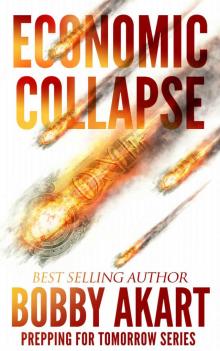 Economic Collapse (Prepping for Tomorrow Book 2)
Economic Collapse (Prepping for Tomorrow Book 2) Nuclear Winter Armageddon
Nuclear Winter Armageddon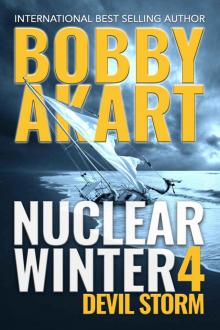 Nuclear Winter Devil Storm
Nuclear Winter Devil Storm Virus Hunters 3: A Medical Thriller
Virus Hunters 3: A Medical Thriller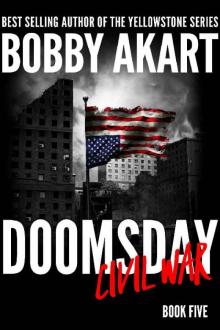 Doomsday Civil War: A Post-Apocalyptic Survival Thriller (The Doomsday Series Book 5)
Doomsday Civil War: A Post-Apocalyptic Survival Thriller (The Doomsday Series Book 5)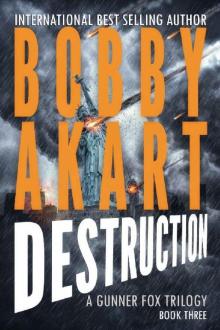 Asteroid Destruction
Asteroid Destruction Geostorm the Shift
Geostorm the Shift Asteroid Discovery
Asteroid Discovery Virus Hunters 2: A Medical Thriller
Virus Hunters 2: A Medical Thriller Geostorm The Shift: A Post-Apocalyptic EMP Survival Thriller (The Geostorm Series Book 1)
Geostorm The Shift: A Post-Apocalyptic EMP Survival Thriller (The Geostorm Series Book 1) Asteroid Diversion
Asteroid Diversion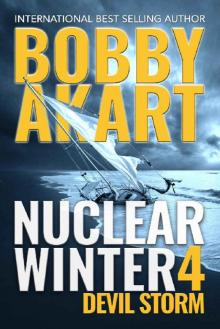 Nuclear Winter Devil Storm: Post Apocalyptic Survival Thriller (Nuclear Winter Series Book 4)
Nuclear Winter Devil Storm: Post Apocalyptic Survival Thriller (Nuclear Winter Series Book 4) Geostorm The Pulse: A Post Apocalyptic EMP Survival Thriller (The Geostorm Series Book 2)
Geostorm The Pulse: A Post Apocalyptic EMP Survival Thriller (The Geostorm Series Book 2) Yellowstone: Survival: A Post-Apocalyptic Survival Thriller (The Yellowstone Series Book 4)
Yellowstone: Survival: A Post-Apocalyptic Survival Thriller (The Yellowstone Series Book 4)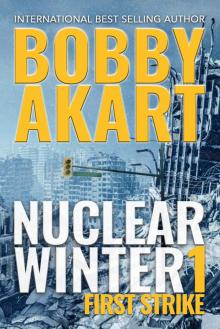 Nuclear Winter First Strike: Post-Apocalyptic Survival Thriller
Nuclear Winter First Strike: Post-Apocalyptic Survival Thriller Nuclear Winter Whiteout
Nuclear Winter Whiteout Doomsday Anarchy
Doomsday Anarchy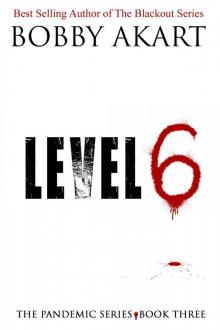 Pandemic: Level 6: A Post Apocalyptic Medical Thriller Fiction Series (The Pandemic Series Book 3)
Pandemic: Level 6: A Post Apocalyptic Medical Thriller Fiction Series (The Pandemic Series Book 3) Martial Law
Martial Law Odessa Reborn: A Terrorism Thriller (Gunner Fox Book 4)
Odessa Reborn: A Terrorism Thriller (Gunner Fox Book 4) New Madrid Earthquake
New Madrid Earthquake Beyond Borders: Post Apocalyptic EMP Survival Fiction (The Lone Star Series Book 2)
Beyond Borders: Post Apocalyptic EMP Survival Fiction (The Lone Star Series Book 2)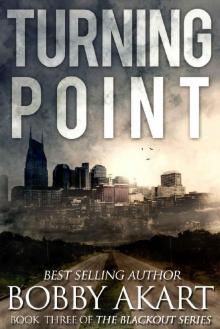 The Blackout Series (Book 3): Turning Point
The Blackout Series (Book 3): Turning Point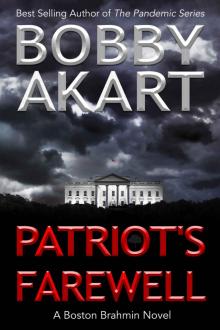 Patriot's Farewell: A Political Thriller Fiction Series (Boston Brahmin Political Thrillers Book 7)
Patriot's Farewell: A Political Thriller Fiction Series (Boston Brahmin Political Thrillers Book 7) Lines in the Sand_Post Apocalyptic EMP Survival Fiction
Lines in the Sand_Post Apocalyptic EMP Survival Fiction The Mechanics: A Post-Apocalyptic Fiction Series
The Mechanics: A Post-Apocalyptic Fiction Series The Loyal Nine
The Loyal Nine Axis of Evil
Axis of Evil Axis of Evil: Post Apocalyptic EMP Survival Fiction (The Lone Star Series Book 1)
Axis of Evil: Post Apocalyptic EMP Survival Fiction (The Lone Star Series Book 1) Lines in the Sand: Post Apocalyptic EMP Survival Fiction (The Lone Star Series Book 3)
Lines in the Sand: Post Apocalyptic EMP Survival Fiction (The Lone Star Series Book 3) Odessa Strikes
Odessa Strikes The Blackout Series (Book 4): Shiloh Ranch
The Blackout Series (Book 4): Shiloh Ranch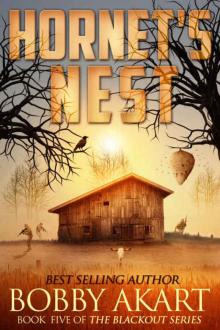 Hornet's Nest: A Post Apocalyptic EMP Survival Fiction Series (The Blackout Series Book 5)
Hornet's Nest: A Post Apocalyptic EMP Survival Fiction Series (The Blackout Series Book 5) Yellowstone: Fallout: A Post-Apocalyptic Survival Thriller (The Yellowstone Series Book 3)
Yellowstone: Fallout: A Post-Apocalyptic Survival Thriller (The Yellowstone Series Book 3) Electromagnetic Pulse
Electromagnetic Pulse Texas Strong: Post Apocalyptic EMP Survival Fiction (The Lone Star Series Book 4)
Texas Strong: Post Apocalyptic EMP Survival Fiction (The Lone Star Series Book 4) Fifth Column_Post Apocalyptic EMP Survival Fiction
Fifth Column_Post Apocalyptic EMP Survival Fiction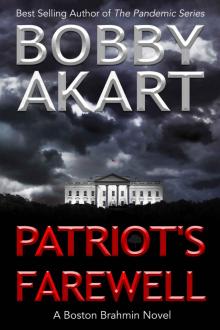 Patriot's Farewell
Patriot's Farewell Texas Strong_Post Apocalyptic EMP Survival Fiction
Texas Strong_Post Apocalyptic EMP Survival Fiction Pandemic: The Innocents: A Post-Apocalyptic Medical Thriller Fiction Series (The Pandemic Series Book 2)
Pandemic: The Innocents: A Post-Apocalyptic Medical Thriller Fiction Series (The Pandemic Series Book 2) Shiloh Ranch: A Post Apocalyptic EMP Survival Fiction Series (The Blackout Series Book 4)
Shiloh Ranch: A Post Apocalyptic EMP Survival Fiction Series (The Blackout Series Book 4) Cyber Attack
Cyber Attack Beyond Borders
Beyond Borders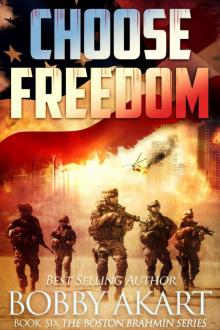 Choose Freedom: A Post-Apocalyptic Fiction Series (The Boston Brahmin Book 6)
Choose Freedom: A Post-Apocalyptic Fiction Series (The Boston Brahmin Book 6) False Flag
False Flag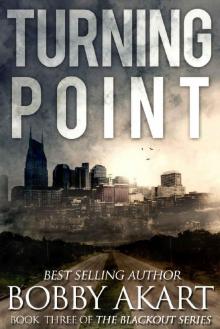 Turning Point: A Post Apocalyptic EMP Survival Fiction Series (The Blackout Series Book 3)
Turning Point: A Post Apocalyptic EMP Survival Fiction Series (The Blackout Series Book 3)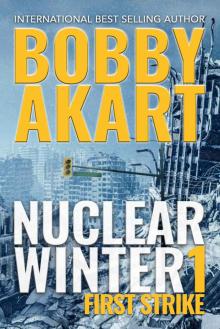 Nuclear Winter First Strike
Nuclear Winter First Strike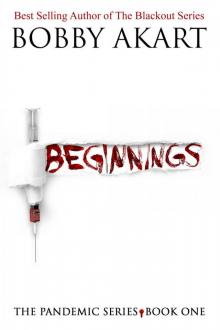 Pandemic: Beginnings: A Post-Apocalyptic Medical Thriller Fiction Series (The Pandemic Series Book 1)
Pandemic: Beginnings: A Post-Apocalyptic Medical Thriller Fiction Series (The Pandemic Series Book 1) Devil's Homecoming: A Post Apocalyptic EMP Survival Fiction Series (The Blackout Series Book 6)
Devil's Homecoming: A Post Apocalyptic EMP Survival Fiction Series (The Blackout Series Book 6) The Blackout Series (Book 6): Devil's Homecoming
The Blackout Series (Book 6): Devil's Homecoming Yellowstone: Inferno: A Post-Apocalyptic Survival Thriller (The Yellowstone Series Book 2)
Yellowstone: Inferno: A Post-Apocalyptic Survival Thriller (The Yellowstone Series Book 2) Fifth Column: Post Apocalyptic EMP Survival Fiction (The Lone Star Series Book 5)
Fifth Column: Post Apocalyptic EMP Survival Fiction (The Lone Star Series Book 5) Yellowstone: Hellfire: A Post-Apocalyptic Survival Thriller (The Yellowstone Series Book 1)
Yellowstone: Hellfire: A Post-Apocalyptic Survival Thriller (The Yellowstone Series Book 1) The Blackout Series (Book 2): Zero Hour
The Blackout Series (Book 2): Zero Hour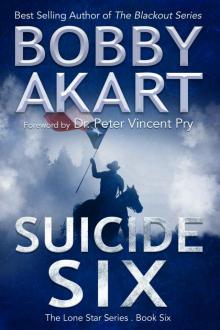 Suicide Six: Post Apocalyptic EMP Survival Fiction (The Lone Star Series Book 6)
Suicide Six: Post Apocalyptic EMP Survival Fiction (The Lone Star Series Book 6)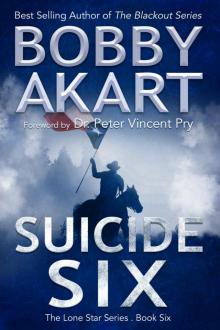 Suicide Six_Post Apocalyptic EMP Survival Fiction
Suicide Six_Post Apocalyptic EMP Survival Fiction Zero Hour: A Post-Apocalyptic EMP Survival Fiction Series (The Blackout Series Book 2)
Zero Hour: A Post-Apocalyptic EMP Survival Fiction Series (The Blackout Series Book 2) Beyond Borders_Post Apocalyptic EMP Survival Fiction
Beyond Borders_Post Apocalyptic EMP Survival Fiction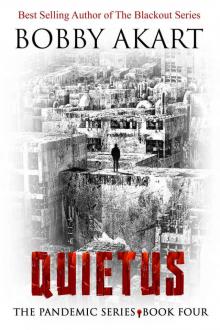 Pandemic: Quietus: A Post-Apocalyptic Dystopian Fiction Series (The Pandemic Series Book 4)
Pandemic: Quietus: A Post-Apocalyptic Dystopian Fiction Series (The Pandemic Series Book 4) 36 Hours: A Post-Apocalyptic EMP Survival Fiction Series
36 Hours: A Post-Apocalyptic EMP Survival Fiction Series Cyber Warfare
Cyber Warfare